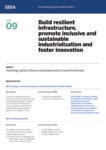What does BBVA do to promote industry development, innovation and infrastructure upgrades?
Climate change is forcing countries and the private sector to gaze into the future from a different point of view, one in which technology opens new paths to contribute to the development of societies. This is the scenario based on which the UN has defined its Sustainable Development Goal (SDG) No. 9: Build resilient infrastructure, promote inclusive and sustainable industrialization and foster innovation. BBVA has committed to - and is already - contributing to the achievement of this goal.

A sustainable, resilient and quality infrastructure is essential to curb CO2 emissions responsible for the greenhouse effect. Hence the importance of financing projects that address climate concerns, such as low emission and green investments.
In this sense, Kristalina Georgieva, Chief Executive Officer of the World Bank, has said that "We cannot ignore the new reality of powerful weather events that threaten jobs, homes, food security and other critical areas of our lives.” The infrastructure that is built today must be ready to cope with tomorrow's changing climate. We need the right incentives and regulations to urgently accelerate funding to these projects.”
The Organization for Economic Cooperation and Development (OECD) has also stated that it is essential to scale up investment efforts in low-emission and sustainable infrastructures. According to its 'Investing in Climate, Investing in Growth' report, investment in green or low carbon infrastructures, combined with structural reforms, could increase global Gross Domestic Product (GDP) by as much as 5 percent by 2050, while cutting emissions.
BBVA’s Contribution
In its determination to contribute to the financing of green and inclusive infrastructures and within its climate change and sustainable development strategy, conveyed in its Pledge 2025, BBVA has committed to mobilizing up to €100 billion between 2018 and 2025 in sustainable financing across a range of industries, including infrastructure and agribusiness.
True to this pledge, in 2018 BBVA allocated €1.6 billion euros to fund environmentally friendly infrastructure and agribusiness projects.
Through 2025, BBVA expects to funnel up to €12 billion in funding towards education, health, social housing and sustainable transport related infrastructures. It also expects to allocate part of these resources to the issuance of intermediated social bonds as bookrunner (underwriter, lead manager or coordinator of a bond issue), investment funds and corporate acquisitions, as well as to the financing of agribusiness projects verified to meet sustainability criteria.

In 2018, BBVA allocated 1,601 million euros in financing environmentally friendly infrastructure and agribusiness projects
Fostering Innovation
SDG No. 9 also aims to promote and back technological innovation by enabling broader and better access to information. Innovation is vital to the present and future success of companies, because it allows them to increase their level competitiveness, productivity and sustainability.
But also, making the most of tech developments as they emerge, in an ever-changing world, is no longer an option, but a necessity. This is an important strategic element that allows, not only to embrace new organizational and managerial approaches, but also to improve processes and thereby generate social benefits.
For a number of years now, BBVA has been working on its transformation process as a way to deliver on its purpose of "bringing the age of opportunity to everyone," and its "Creating Opportunities” corporate motto. The bank aims to contribute to help its customers, both private and corporate, meet their goals, bringing them the best products and services, with a focus on digitization.
Indeed, BBVA is currently undertaking its digital transformation, aimed at delivering the best customer experience by promoting the use of digital channels. The results of this approach are evident: As of 2018 year-end, 51.43% of its customer base was digital, with 43.45% of customers interacting via mobile.
At the end of the first quarter of 2019, the bank's digital customer base peaked at 28.4 million, 53% of the total, after growing 17% year-on-year. The number of mobile customers grew by 25% . In the same way, digital accounted for 57% of the total number of product and service units sold.
Fintech Partnerships
As part of its transformation process to adapt to the new reality of the financial industry, BBVA is exploring new business models. In this sense, the bank is focusing on building alliances and synergies with businesses from the so-called ‘fintech’ world, a bustling and dynamic ecosystem that is growing fast thanks to technological progress and the widespread adoption of digital technologies.
As part of this process, BBVA’s open innovation program, entitled 'fast track', opened the door to collaborations with several financial technology startups that have become or are becoming strategic allies of the bank, helping it deliver new digital products and services in benefit of its customers and society as a whole.
Also, BBVA has rolled out a number of initiatives, including Open Talent and its New Digital Businesses area, aimed at incubating and building fintech businesses. As a result, the company has launched a number of projects, including Covault, a 'startup' specializing in online identity protection through biometrics; or Azlo, a 'startup' that offers 'online' banking services for small businesses and self-employed workers.
Another example of initiatives that have spawned from its fintech partnerships is BBVA Valora, a tool that, using 'big data', offers guidance regarding real estate property prices based on location. The project has already expanded to several Latin American countries. In Mexico, the company entered into a partnership with local startup Openpay, a company that offers a wide range of payment solutions and advanced online functionalities for shops & retailers. The company was subsequently acquired by BBVA.
These are just some examples of the progress made by BBVA in its digital transformation process, with which it also aims to contribute to the UN Sustainable Development Goal no. 9.
BBVA and the SDGs
BBVA’s ‘Pledge 2025' is part of the Group’s commitment to contribute to the achievement of the Sustainable Development Goals (SDG). These goals, championed by the United Nations, are a call to action to end poverty, protect the planet and ensure that all people enjoy peace and prosperity.
These 17 Goals build on the successes of the Millennium Development Goals, while including new areas such as climate change, economic inequality, innovation, sustainable consumption, peace and justice, among other priorities. Thanks to its broad range of businesses – including the BBVA Microfinance Foundation - and its global footprint, the BBVA Group contributes to all these goals.
